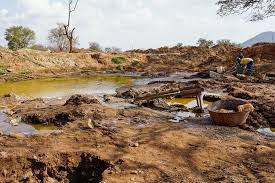
THE recent announcement by the government to ban riverbed mining is a commendable move, but it is not without its shadows.
This is not the first time such a ban has been introduced, and history tells us that mere declarations are often inadequate.
The reality on the ground is far more disheartening.
Riverbed mining, a practice that should have been halted years ago, continues to devastate our rivers, communities, and environment. Since 2011, the country has allowed large scale and mechanical alluvial mining which has resulted in water pollution, siltation and degradation of river channels.
In October 2020, the government imposed a similar ban, yet, as we observe today, the enforcement of that ban was either weak or non-existent. The fast-growing unregulated small-scale mining activities and the rise of gold rushes have threatened human and livestock lives.
Over 60% of Zimbabwe’s gold is produced by small-scale miners, many of whom source the yellow metal through riverbed mining.
The result has been the unchecked continuation of this destructive practice, with dire consequences for our rivers and the people who depend on them. Rivers like the Odzi, Nyagadzi in Chendambuya, Mazowe, Munyati, Insiza, Save, Mutare, and Angwa stand as a tragic testament to the failure of previous efforts to curb riverbed mining.
Once a lifeline for local communities, the rivers are now so polluted that they can no longer support even basic human needs.
- Byo author eyes SA award
- WB revises downwards Zim growth
- Letters: Zanu PF to blame for anything wrong in Zim
- Shortages show the poverty of ideas in govt
Keep Reading
The water is contaminated with harmful chemicals like cyanide, rendering it dangerous and unfit for consumption.
The contamination of the water sources has led to the instant death of fish and livestock, as well as an increase in diseases like tuberculosis and skin cancer amongst humans.
According to an Environmental Management Agency (Ema) survey done in 2021, about 1 555 kilometres of river channels had been affected through water pollution and siltation.
The level of pollution in the rivers is both saddening and shocking.
The sight of discoloured, toxic waters flowing through what were once vibrant ecosystems is a stark reminder of the damage inflicted by unchecked mining activities.
The pollution not only poses an immediate threat to the health of villagers but also has long-term implications for the environment and biodiversity.
The toxins released into these rivers can seep into the soil, affecting agriculture and livestock, which are the primary sources of livelihood for many rural communities.
In essence, the environmental degradation caused by riverbed mining is directly linked to the economic hardship faced by these communities.
It is particularly disturbing to consider the potential for widespread harm.
The contamination of rivers with cyanide and other dangerous chemicals could be silently killing villagers across the country.
The full extent of this crisis may never be known, but the evidence at hand is enough to warrant urgent and decisive action.
The time for talk is over; it is now time for the government to act.
The recent Cabinet directive to ban riverbed mining must be more than just a policy announcement.
The government must not only implement stringent measures to stop further riverbed mining but also hold accountable those who have flouted the law in the past.
This includes mining companies that have failed to rehabilitate mined areas and individuals who have engaged in illegal mining activities.
Ema must be empowered and resourced to carry out its mandate effectively.
Moreover, the government must address the root causes of illegal riverbed mining. Poverty and lack of economic opportunities drive many to engage in these activities.
Without addressing these underlying issues, the ban may only lead to temporary compliance, with miners returning to the rivers as soon as enforcement wanes.
The government’s ban on riverbed mining is a necessary step, but it is just the beginning. The cost of inaction is too high, and the damage already done serves as a grim reminder of what is at stake.
Now is the time to act, to enforce, and to save our rivers before it is too late.










